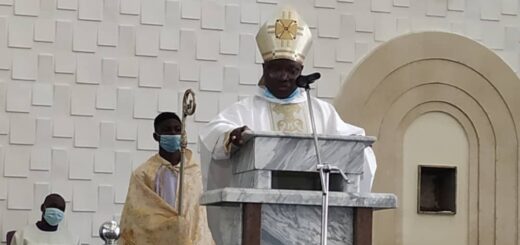The Merciful Face of God
by ARCH BISHOP · October 30, 2022
31st Sunday in Ordinary Time, 30th October 2022, Our Lady Queen of Nigeria Pro-Cathedral, Abuja. Homily by Archbishop I. A. Kaigama.
Readings: Wis. 11:22-12:2; Ps. 144:1-2. 11-14; 2 Thess. 1:11-2:2; Lk. 19:1-10.
The Merciful Face of God
Today I wish to talk about the merciful face of God by first celebrating His mercy as we accept and present before the altar the newborn daughter of Mr Sunday Emola, my cook since April 2004, and his beloved wife Grace, since 7th November 2009. In gratitude, they have come to rejoice in God’s goodness and mercy. We welcome their child, dear little Mary to this world and wish her and her three older brothers God’s continuous grace, wisdom, strength and progress.
As far back as the world has been around, people have been making predictions about the end of the world by floods, fires, violence, wars, comets, etc. Those who can, will remember the feverish prayer intercessions and the enthusiasm with which people participated at the vigil during the transition from 31st December 1999, to the minute ushering in January 1, 2000. There were widespread predictions of a Y2K (the Year 2000) computer bug that would crash many computers or cause malfunctions leading to major catastrophes worldwide, and that society would cease to function.
For us Christians, St. Paul is clear: “To turn now, brothers, to the coming of our Lord Jesus Christ and how we shall all be gathered round him: please do not get excited too soon or alarmed by any prediction or rumour… that the Day of the Lord has already arrived.” (2 Thess. 2:1-2).
What matters for us Christians is the “sacrament of the present moment”, the total surrender of the self to God and complete obedience to His will in every moment of living. What the author of Wisdom tells us in the first reading is that like God, we should always be merciful to all, and overlook people’s sins against us so that they can repent. God loves all that exists, and holds nothing of what He has made in abhorrence or hatred. Little by little, God corrects those who offend, He admonishes and reminds them of how they have sinned, so that they may abstain from evil and trust in Him. The Psalmist in today’s Responsorial Psalm summarizes: I will bless your name forever, O God my King (cf. Ps. 144 (145):1-2, 8-11, 13b-14). This is because he realizes that if the Lord should mark our guilt, none would survive (cf. Ps. 130:3).
The second reading contains St. Paul’s encouragement to the Thessalonians to persevere in their Christian faith and to carry on doing good as they wait in hope for the second coming of Jesus Christ. Paul exhorted them to conduct themselves in a way worthy of their Christian calling and to carry on with every sense of purpose pleasing to God. He tried to neutralize their misunderstandings about the Day of the Lord; which some believed had already come, and quitted their work and became nuisances of themselves and to others.
The life-changing encounter of Zacchaeus upon meeting Jesus in the gospel reading offers us great spiritual insights about the right direction to take, leading lives truly waiting on the Lord. Here is Zacchaeus, a rich man who found salvation when he surrendered everything to God, not letting his ill-gotten wealth pose an obstacle.
Zacchaeus, although a wealthy chief tax collector, did not have it all. He was not only short of height; he was spiritually short, with a severed relationship with God (cf. Is. 59:2). His wealth, acquired in both legitimate and illegitimate means, could not quench the deep desires and longings of his heart. Zacchaeus might have heard about Jesus and earnestly wanted to get a real glimpse to satisfy his curiosity. The pressing crowds made it difficult for him to see Jesus, but his determination led him in childlike humility to climb a sycamore tree ahead of the crowds (cf. Mt. 18:3).
The sycamore tree stood for Zacchaeus as a tree of hope, a tree of faith and a place of succour that helped him rise above the obstacles posed by the crowds to see Jesus. The sycamore tree reflects the Church, from which we can encounter Jesus in the Word and the Sacraments. Through the Church, Jesus meets us, helps us, renews and sanctifies us.
Jesus saw the admiration and enthusiasm in Zacchaeus and moved by compassion, He stopped to have a life-changing conversation with the man who came down from the tree. It is important to note here that whoever comes looking for Jesus or waits upon the Lord, does not do so in vain.
Contrary to expectations, Jesus would have gone to the house of the “righteous,” namely, the Chief priests, Scribes, Pharisees, Sadducees, etc, rather than to the house of a Chief tax collector, and presumably a chief sinner according to the standards of the time. By entering the house of Zacchaeus, Jesus showed love to the sinner, but hated his sin. He restored his dignity and sense of self-worth. Zacchaeus thus broke away from his sinful habits and past ways to recreate a healthy relationship with God. His solemn announcement of his firm commitment to doing justice by sharing his wealth to the poor and making restitution in fourfold to the defrauded should be a vade mecum (a guide for ready reference) for our leaders who have for long deprived the poor so much. This is a call to mindfulness in our nation, where large sums of money meant for the public good are stolen, misappropriated and diverted by those in political offices and public service.
It is not enough to have a change of heart and repent of past sins, but to restore to the rightful owners what is truly theirs. We continue to hope that the financial crimes and nation-crippling activities will be curbed by the relevant financial crime agencies and that the recovered national assets will be put to judicious use such as building first-class, well equipped and properly managed hospitals in every geopolitical zone with citizens having easy access to them. It is so sad that some of these funds are recovered only to be stolen again by others. Zacchaeus was willing to take up his social responsibility towards his neighbours and so proves for us a model of a new political culture, giving up kleptocratic tendencies for equity and fairness to hold sway. Our nation will experience greater success when greed changes to generosity and selfishness to selflessness.
In this political season, people, depending on their political leaning, loyalty or sensitivity are filled with morbid fear and demonstrate paranoid political tendencies and hypersensitivity. Some people want to fight their way to power. Some apply the allure of money; some by gentle persuasion, but some, by hook or by crook. Some are so bitter that they neither forgive nor forget political wrongs even if they profess belief in God. Some exclude dialogue and friendly encounters and if you dare to say a good word, a positive word, about an opposition partner, or be seen in his/her company you become their instant enemy. This is what I call immature politics or politics without principles or decorum. Such people can unleash venomous anger on others for daring to be different. Instead of wooing you, they try to antagonize or even dehumanize you; make you feel you are committing an offence. Why fight and be ready to injure others for political interests? Ready to terminate life or assassinate character? Rubbish others even when you know deep within you that it is not right?
Today we should open up our hearts and minds to God, and ask Jesus to reach out to all of us as He did to Zacchaeus. We ask for an outpouring of grace to be true to our personal commitments. We want our children like little Mary being dedicated today to grow up in a less politically toxic environment, economically exploitative system or morally dehydrated ambience. May we hear Jesus saying to us, “Today salvation has also come to this house because this man [woman] too is a son [daughter] of Abraham” (Lk. 19:9).




